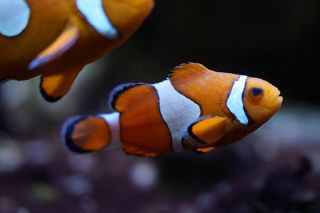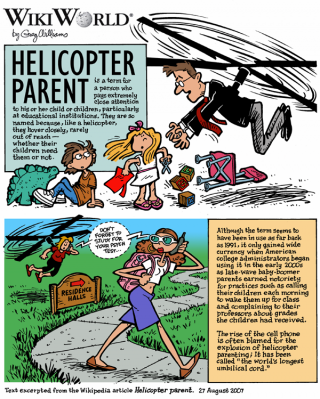Parenting
Overprotective Parenting Doesn't Work
Even the most vulnerable kids need to negotiate risks to grow.
Posted February 2, 2015

Readers, this 24/7 news cycle we now inhabit is NOT our friend.
Yep, you heard me right. I just pointed out we’re living inside a virtual bubble of bad news. Not to mention gossip, bullying, meanness, and strident opinion-mongering. And I'll stand by my claim.
We’re all susceptible to the impact of these forces--unless we live entirely off the grid. Which seems increasingly like a reasonable idea.
Our virtual bad-news bubbles scare us. We appear to be a nation--a world, really--perpetually looking over its shoulder.
I could get on that plane, and maybe I will. But what are my chances of being hijacked, underwear-bombed, or disappeared right off the face of the earth? 50/50?
I could let my kid walk to the playground on her own and just hang out a little. But some girl her age was abducted/raped/murdered/wandered into the woods and died/you name it, just last week. Three-thousand miles away. But hey--it could happen here, couldn’t it? So maybe I’ll just go with her so I can scare off the rapists or follow her if she wanders beyond my field of vision. (Query to self: binoculars?)
The problem with letting this relentless, nightmare-inducing, revenue-boosting bad news take over our parenting and our lives, is that we end up teaching our kids they’re supposed to be scared, too.
And let me tell you: if you're scared and they’re scared, they will sit around all day and live vicariously. For example, as characters in video games who take gigantic risks but don’t have to suffer real consequences--the bad ones OR the good ones.
But at least if they're holed up in their rooms, playing video games, you can keep an eye on them, right? You can make up some lame excuse to barge in every 10 or 20 minutes and check up on them. (This strategy works best if it involves a junk-food offering. Trust me, I know. But please do not trust me on the first sentence of this paragraph, because as you probably already know, it's dead wrong.)
As it turns out, negotiating real-life, reasonable risk can be a really good thing for kids. It can teach them that they have power in this world--or someday will. That they’re competent. And that sometimes, if you really really want something to happen, you have to MAKE it happen, without mom or dad’s help--even if it’s scary to try.
This is a lesson that took me way too many years to learn. People like me, who've inherited clinically significant anxiety (which can also be a gift, as I recently wrote here, in the journal Cognoscenti), and are submersed, on top of it, in unending reports of bombs in underwear, beheadings, children used as living weapons and children abused and abducted and falling down cliffs--well, we can find it pretty damned hard to give our kids a little leash.
(Between you and me, I can’t even give my DOG a little leash. He’s as anxious as I am. He’s even afraid of our bunny--so how can I take him to the dog park and let him run around with all those self-confident canines?)
Hey. I don’t want the kids OR the dog to get eaten, you know what I’m saying?
Well, that helicopter strategy backfired. Because Benjy was extremely vulnerable--prone to self-harm, suicidal, often victimized, sometimes unable to crawl out of his bed and face the world--I never let him out of my sight unless I HAD to (and when I knew there were competent adults around who could take my eagle-eyed place).
Yeah, that was fun for both of us. (Umbrellas-up, it's raining irony!)
And it was only after I HAD to step away and give him the space he needed to grow, that I realized just how significantly my own fear had held him back.
Why did I have to step away? Because my love for him was so full and rich and frightened that it increased HIS fear. Which led him straight into the psychiatric hospital--6 times before he turned 13, but who’s counting?
Now, don’t misunderstand me. My helicoptering had nothing to do with ambition. I was for many years a college professor. I have sneered countless times at those parents who worry that Jack or Jill, age 6, WILL NEVER GET INTO HARVARD OR MIT unless mom starts working the admissions team ASAP. Or at the dad who calls me to inquire into his sophomore's grade in my Lit class (note to dad: ILLEGAL). Or worse yet--to bully me into raising that grade after said sophomore's bullying efforts have failed.

UGH. No. For me, it felt like a matter of life or death. Who cares about college, when you live day-to-day and never know how many family members you will have next week?
To be fair to myself, my only technical responsibility for Ben’s mental illness is a genetic one--and it’s a responsibility shared with Lars, my husband. We both have some crazy genes. And some really wonderful ones. Both of our kids inherited some of each.
But here's the thing: my morbid fear of losing Ben prevented him from realizing his splendid potential. And when Lars and I fully understood that, we knew he’d do better, at least for a while, in a different environment.
All I can say, now that my ripped heart has almost mended, is WOW. We never knew that Ben is an athlete until he went away to school. Or a leader. But he is both. He’s the go-to tour guide for prospective students and families visiting his school. He leads student meetings. He even excels at “risky” things now--the kinds of things I’d have been terrified to let him try. Rock climbing. Kayaking. Skiing. Fishing. Go-Kart racing. He’s even participating in team sports these days, pushing back his fear (like many vulnerable kids he’d had some bad experiences on sports teams in the past) and just doing it. He’s not the best baseball player on his school team, but he plays, he learns--and every time he does, he conquers some pretty serious anxieties.
I never hemmed Ben in because I didn’t--or don’t--love him. Oh, man, do I love him. In many ways, he’s my hero. He’s been climbing this ginormous mountain (a metaphorical one, for the most part) every single day since he was about 2 years old. Yes, he has considered checking out of here--this world, I mean--on more than one occasion. He’s begged me to help him buy his one-way ticket out (the worst moment of my life times a billion). But he has always gone back to climbing, climbing. climbing.
Through it all, I only did what I knew I could: folded him in my arms, close to my heart, and vowed to never let go.
In case you’re wondering, I haven’t totally “let go,” even though he spends his weekdays away from me. We see him almost every weekend. I am the one person who is always on top of the important things: what meds he’s on and whether we need to consider a tweak; what he’s learning about in history or science; what he thinks about The Taming of the Shrew (he thinks it sucks to be Catherine because she’s treated like property--that’s my boy!). Is he happy? Does he need advice on self-advocating to his therapist/teacher/residential staff/peers? Which girl approached him on the beach Tuesday and which on Thursday? Who was the blond and who the brunette?
I am the one who listens with delight to anything and everything he cares to tell me. Every time I bring him home from school on a Friday afternoon I learn new stuff. I admire his toned strength. His empathy. And his latest risk-taking adventure.
And guess what? I’m learning to sit quietly with my own fear while I try to watch him take risks. Yesterday I took him skiing. I had to look away while he rode up the chair lift. I gasped a couple of times when I feared he might not know how to turn at high speeds and avoid killing a younger child by skiing right over her.
He knows. He's fast, and he's good. He skied over no one. He's a great person to hang out with--even if you happen to be his mother.
The thing is, I really don’t need to worry 24/7. He’s more than competent. He picks things up fast, and he does them with thoughtfulness and care. He is not yet 15, so I know he’s going to make some spectacular mistakes, some dumb decisions, before he finishes growing up--and probably after, too, like everyone else. And I know now that I have to step back and let him make them--and learn from them. I just hope it doesn't kill me.
As long as I don't have to look on while spectacular mistakes happen, I should be OK. Watching without a few fingers covering my eyes, I'm not yet ready for.




